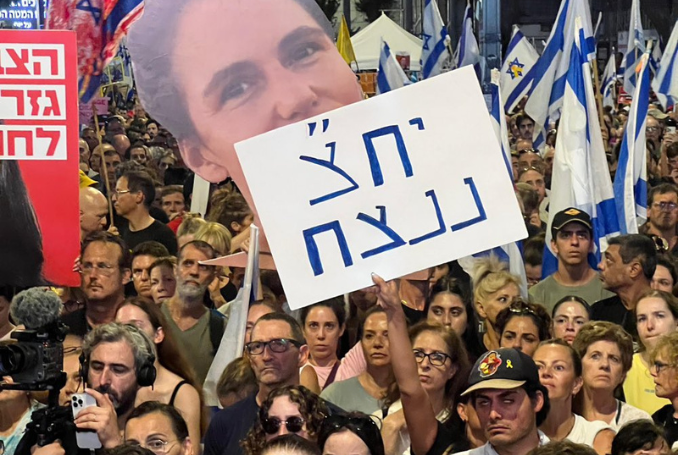
“Despite the noise in the Israeli media, the negotiations are moving forward diligently through the mediators, and claims of their collapse are not true.”
A top Palestinian official has told the Al Mayadeen news channel that negotiations for a ceasefire in Gaza “are progressing well but face obstacles that are not easy to overcome.”
“Despite the noise in the Israeli media, the negotiations are moving forward diligently through the mediators, and claims of their collapse are not true,” the unnamed leader said in an exclusive interview with the Beirut-based channel on Thursday.
The channel said he pointed to “the first obstacle” in the talks being “Israel’s stance on withdrawing from the Philadelphi Corridor in the first phase.”
Ceasefire talks in #Gaza are progressing, but key challenges remain, as a Palestinian leader reveals to #AlMayadeen. https://t.co/3YBdLha9ch
— Al Mayadeen English (@MayadeenEnglish) December 26, 2024
The second obstacle was “the occupation’s refusal to release a number of prisoners sentenced to life imprisonment,” while the third was “Israel’s insistence on keeping its forces inside the Gaza Strip in the first phase,” said the report.
He clarified that “Israel insists on remaining in the Philadelphi Corridor in the first phase, but Hamas refuses to accept this.”
“Hamas insists on the release of about 200 prisoners sentenced to life imprisonment in the first phase,” he explained.
According to the report, he also pointed out that “Israel insists on Hamas agreeing to a specific list of 34 prisoners in Gaza, who would be released in the first phase.”
Israel Causing ‘Delay’
On Wednesday, Hamas released a statement saying that the talks were proceeding in Doha “in a serious manner” but that Israel had set new conditions causing a delay in an agreement.
“The ceasefire and prisoner exchange negotiations are proceeding in Doha with Qatari and Egyptian mediation in a serious manner, and the movement has shown responsibility and flexibility,” the movement said.
Hamas Says Talks Proceeding, but Israel’s New Conditions Cause Delay
Hamas, however, added that “the occupation has set new issues and conditions related to withdrawal, ceasefire, prisoners, and the return of the displaced, which has delayed reaching the agreement that was available.”
Efforts by mediators from Egypt, Qatar, and the US to broker a truce have gained traction in recent weeks, but a breakthrough has yet to be announced.
Ongoing Genocide
The ongoing Israeli assault on the Gaza Strip, which began on October 7, 2023, has led to a humanitarian crisis of unprecedented scale. As the death toll among besieged and starved Palestinian civilians continues to rise daily, Israel is currently facing charges of genocide against Palestinians before the International Court of Justice (ICJ).
AL-JAZEERA: The Israeli occupation forces set the Kamal Adwan Hospital on fire after storming it this morning. pic.twitter.com/31obIQGOvq
— The Palestine Chronicle (@PalestineChron) December 27, 2024
According to Gaza’s Ministry of Health, at least 45,399 Palestinians have been killed, and more than 107,940 have been wounded since the start of the war. The toll is expected to rise further, with at least 11,000 people still unaccounted for, presumed dead under the rubble of their homes across Gaza.
The war, which Palestinians call “Operation Al-Aqsa Flood,” began after a military operation carried out by Hamas on Israeli territory. Israel reports that 1,200 of its soldiers and civilians were killed during the initial attack on October 7. However, Israeli media have raised concerns that a significant number of Israeli casualties were caused by ‘friendly fire’ during the assault.
Humanitarian Disaster
Human rights organizations, both Palestinian and international, have reported that the overwhelming majority of the casualties in Gaza are women and children. The ongoing violence has also exacerbated an acute famine, with thousands of children among the dead, highlighting the severity of the humanitarian disaster.
People in #Gaza are going through “one of the most brutal wars in recent history” tells @JulietteTouma to @RTE. Children are especially at risk.#CeasefireNowhttps://t.co/jGkB5nE2Gi pic.twitter.com/wk2rbqHTly
— UNRWA (@UNRWA) December 27, 2024
The war has displaced nearly two million people from their homes across Gaza, with the majority of the displaced forced into the already overcrowded southern region of the Strip. The population in Gaza remains trapped in the ongoing conflict, with little access to basic necessities such as food, water, and medical care.
(Al Mayadeen, PC)